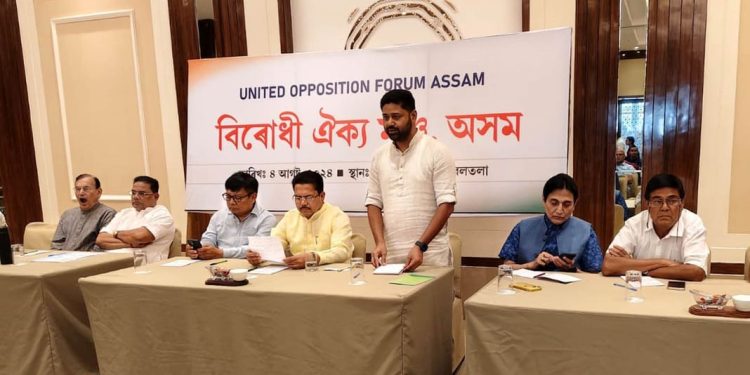As the 2026 Assam Legislative Assembly elections approach, the political landscape is heating up, with growing attention on a critical theme: opposition unity in Assam. The Bharatiya Janata Party (BJP), having governed the state for two consecutive terms, continues to hold significant ground, bolstered further by its performance in the recent panchayat elections.
Amid this backdrop, the demand for a united opposition to challenge the BJP has gained urgency. Yet, despite nearly a year of discussions, opposition unity in Assam has remained elusive. A lack of consensus and coordination among various parties has often led to finger-pointing, primarily at the Congress, the largest opposition party in the state.
Recently, Congress MP Gaurav Gogoi was appointed as the new President of the Assam Pradesh Congress Committee. With assembly elections approaching, his appointment has reignited talks about opposition alliances. There is now growing curiosity regarding what stand Gaurav Gogoi will take on forming alliances with other opposition parties.
Akhil Gogoi, MLA from Sivasagar and President of the Raijor Dal, has been vocal about the need for an opposition alliance. He has stated that the onus of building an alliance lies primarily with the Congress, being the principal opposition party in the state.
In May, Akhil Gogoi announced that if Congress did not take a clear stance on the alliance by May 30, his party would field candidates in all 126 assembly constituencies. However, after Gaurav Gogoi assumed the leadership of the Assam Congress, Akhil Gogoi withdrew this decision and said he was now awaiting a positive response from the new Congress President.
Lurinjyoti Gogoi, President of the Assam Jatiya Parishad (AJP), also expressed optimism about opposition unity. In a recent statement to the media, he said, “For the 2026 elections, the opposition must come together politically, and we are hopeful about it. The new Congress President may be considering this seriously. If opposition votes split, it will benefit the BJP and its allies—as we’ve seen in recent elections in Delhi and Haryana. Therefore, decisions must be made based on ground realities. The only effective strategy to defeat the BJP is through unity.”
Since the run-up to the 2024 Lok Sabha elections, several opposition parties—including the Congress, Raijor Dal, CPI(M), AJP, Aam Aadmi Party, and Assam Trinamool Congress—have made multiple attempts to unite. They even formed a joint forum called the Asom Sanmilita Morcha (A.S.M.). Notably, AIUDF was excluded from this alliance, as it was labelled a communal party.
During the 2024 Lok Sabha elections, the alliance saw partial execution. Of the 14 seats in Assam, Congress contested 13, and one seat was left for the Assam Jatiya Parishad.
However, soon after the Lok Sabha elections, cracks began to appear in the opposition alliance, which became evident during the by-elections held in five assembly constituencies. Although some parties proposed seat-sharing, the Congress chose to contest all five seats independently and lost all of them. One of the constituencies was Samaguri, long considered a Congress stronghold, yet even there, the party suffered defeat.
Following this, the Congress distanced itself from the Asom Sanmilita Morcha (A.S.M.). Then-APCC President Bhupen Kumar Borah resigned as the chair of the A.S.M. and was succeeded by Rajya Sabha MP Ajit Kumar Bhuyan.
During the subsequent panchayat elections, the issue of the opposition alliance resurfaced. Once again, Akhil Gogoi urged the Congress to unite with other parties. However, the Congress showed no interest. As a result, all opposition parties contested separately and fared poorly in the polls. Even in Jorhat, where Congress President Gaurav Gogoi had secured a resounding victory in the Lok Sabha elections just a year earlier, the Congress performed poorly in the panchayat polls.
In this political backdrop, the need for opposition unity to counter the BJP has become increasingly evident. With less than a year left for the assembly elections, the pressure is mounting.
The key question now is: What will the Congress’s position on forming an alliance be? Will Gaurav Gogoi, the new state party president, show interest in building a united front with other opposition parties? Or will the Congress prefer to go solo in the 2026 assembly elections?
So far, it seems that Gaurav Gogoi has prioritized strengthening the party organization over alliance talks. In a recent media interaction, when asked about opposition unity, he said, “We are in touch with various political parties at different levels. There’s no need for media cameras to discuss alliances. At the right time, we will have formal and meaningful discussions.”
This recent comment from Gaurav Gogoi signals a positive intent toward alliance-building. However, only a formal meeting among opposition parties will determine whether this intention translates into reality.
What remains undeniable is that in the current political landscape of Assam, forming a strong and united opposition front is essential to mount a credible challenge against the BJP.





